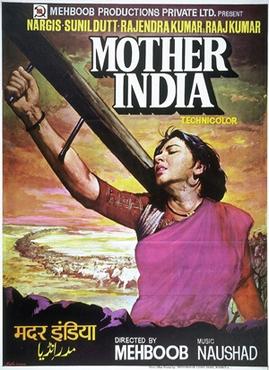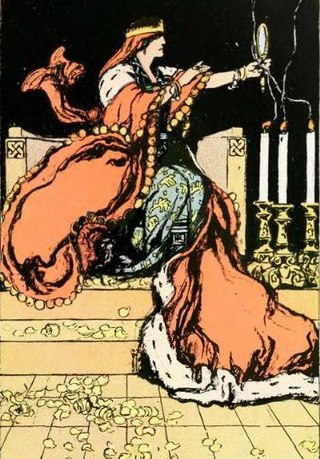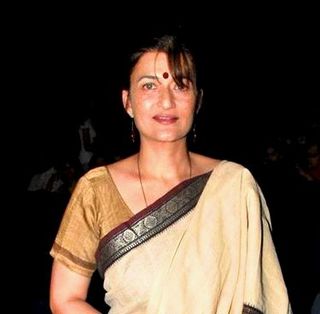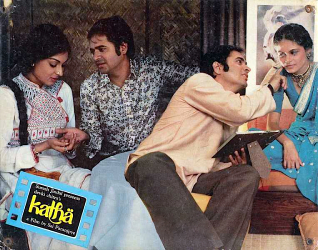
Mother India is a 1957 Indian epic drama film, directed by Mehboob Khan and starring Nargis, Sunil Dutt, Rajendra Kumar and Raaj Kumar. A remake of Khan's earlier film Aurat (1940), it is the story of a poverty-stricken village woman named Radha (Nargis), who in the absence of her husband, struggles to raise her sons and survive against a cunning money-lender amidst many troubles.
Agnes of God is a 1979 play by American playwright John Pielmeier which tells the story of a novice nun who gives birth but does not believe she has. After the child is found dead, a psychiatrist and the mother superior of the convent clash during the resulting investigation. The title is a pun on the Latin phrase Agnus Dei.

Mary Teresa Bojaxhiu, better known as Mother Teresa or Saint Mother Teresa, was an Albanian-Indian Catholic nun, founder of the Missionaries of Charity and is a Catholic saint. Born in Skopje, then part of the Ottoman Empire, she was raised in a devoutly Catholic family. At the age of 18, she moved to Ireland to join the Sisters of Loreto and later to India, where she lived most of her life and carried out her missionary work. On 4 September 2016, she was canonised by the Catholic Church as Saint Teresa of Calcutta. The anniversary of her death, 5 September, is now observed as her feast day.

The Evil Queen, also called the Wicked Queen or the Queen, is a fictional character and the main antagonist of "Snow White," a German fairy tale recorded by the Brothers Grimm. The most popular version of the Evil Queen is the one in Disney's Snow White. The character has also become an archetype that has inspired unrelated works.

Circle Of Three is a series of young adult paperback novels by Michael Thomas Ford under the pseudonym Isobel Bird. It follows the lives of three teenage girls from different social cliques, who come together over a mutual interest in witchcraft. It was published between February 5, 2001 and March 19, 2002.

Bubble is a 2005 American crime drama film directed by Steven Soderbergh about three low-paid doll factory workers, one of whom is murdered. Soderbergh also shot and edited the film under the pseudonyms Peter Andrews and Mary Ann Bernard, taken from his father's given names and his mother's maiden name, respectively. The film was shot on high-definition video.

Sarika Thakur, known mononymously as Sarika is an Indian actress and costume designer. In 2005, she won the National Film Award for Best Actress for the English-language film Parzania. She was also awarded the National Film Award for Best Costume Design for her work in Hey Ram (2001).

Uphaar is a 1971 Hindi film. Produced by Tarachand Barjatya for Rajshri Productions, the film stars Jaya Bhaduri, Swarup Dutta and Kamini Kaushal. The music is by Laxmikant Pyarelal. This film is based on the 1893 short story "Samapti" by Rabindranath Tagore. The film was selected as the Indian entry for the Best Foreign Language Film at the 45th Academy Awards, but it was not nominated. Following years this movie dubbed in various south Indian languages including successful in Malayalam as Upaharam in 1972. "Samapti" was earlier made into a Bengali movie by Satyajit Ray and is a part of his trio of short films released as "Teen Kanya".

Wiccan views of divinity are generally theistic, and revolve around a Goddess and a Horned God, thereby being generally dualistic. In traditional Wicca, as expressed in the writings of Gerald Gardner and Doreen Valiente, the emphasis is on the theme of divine gender polarity, and the God and Goddess are regarded as equal and opposite divine cosmic forces. In some newer forms of Wicca, such as feminist or Dianic Wicca, the Goddess is given primacy or even exclusivity. In some forms of traditional witchcraft that share a similar duotheistic theology, the Horned God is given precedence over the Goddess.
Mary of Saint Peter was a Discalced Carmelite nun who lived in Tours, France. She is best known for starting the devotion to the Holy Face of Jesus which is now one of the approved Catholic devotions and for The Golden Arrow prayer. She also introduced the "Little Sachet" sacramental.

The Nameless is a 1999 Spanish horror film directed by Jaume Balagueró in his directorial debut, and starring Emma Vilarasau, Karra Elejalde, and Tristán Ulloa. Based on the 1981 horror novel of the same name by English writer Ramsey Campbell, it follows a mother who receives a phone call from her believed-deceased daughter five years after her apparent occult-related ritualized murder, uncovering a nefarious cult preoccupied with the metaphysical aspects of corruption and evil.

Ipsita Roy Chakraverti is a Wiccan priestess based in India. Born into an elite family in India with a diplomat for a father and royalty for mother, Chakraverti spent her early years in Canada and the US where her father was stationed. There, she was allowed to join a select group of women studying ancient cultures of the world and the old ways. Chakraverti studied with them for three years and finally chose Wicca as her religion. After coming back to India and getting married, Chakraverti declared herself as a witch in 1986. Amidst the backlash that followed her declaration, Chakraverti explained to the media the Neo Pagan ways of Wicca and its healing power.

Katha is a 1983 Indian romantic comedy film directed by Sai Paranjpye starring Farooq Sheikh, Naseeruddin Shah and Deepti Naval in the main roles. The film is about the daily lives of people living in a Mumbai chawl. The film won the National Film Award for Best Feature Film in Hindi. The story is based on S.G. Sathye's Marathi play Sasa Aani Kasav, which was also adapted into the 1988 movie Mukunthetta Sumitra Vilikkunnu. Film and music expert Rajesh Subramanian reveals that Kishore Kumar sang Maine tumse kuch nahin manga without a remuneration. Since he wanted to render a song for an art house cinema he told director Sai Paranjpe he will do it without a fee.

Iti Mrinalini is a 2011 Indian drama film directed by Bengali filmmaker Aparna Sen. Sen collaborated with Ranjan Ghosh to write both the story and the screenplay. The film was produced by Shrikant Mohta and Mahendra Soni of Shree Venkatesh Films Pvt Ltd. Some critics consider it to be among her best works, ranking with Mr. and Mrs. Iyer and 36 Chowringhee Lane.

There are extensive and varied beliefs in ghosts in Mexican culture. In Mexico, the beliefs of the Maya, Nahua, Purépecha; and other indigenous groups in a supernatural world has survived and evolved, combined with the Catholic beliefs of the Spanish. The Day of the Dead incorporates pre-Columbian beliefs with Christian elements. Mexican literature and cinema include many stories of ghosts interacting with the living.
Leela Mishra was an Indian actress. She worked as a character actor in over 200 Hindi films for five decades, and is best remembered for playing stock characters such as aunts. She is best known for her role of "mausi" in the blockbuster Sholay (1975), Dil Se Mile Dil (1978), Baton Baton Mein (1979), Rajesh Khanna films such as Palkon Ki Chhaon Mein, Aanchal, Mehbooba, Amar Prem and Rajshri Productions hits such as Geet Gaata Chal (1975), Nadiya Ke Paar (1982) and Abodh (1984). Her career's best performance was in Naani Maa in 1981, for which she received Best Actress award at the age of 73.
Kal: Yesterday and Tomorrow is a 2005 Indian Hindi-language thriller drama film written and directed by Ruchi Narain. Produced by Sudhir Mishra under Sudhir Mishra Productions, the film features an ensemble cast of Chitrangda Singh, Shiney Ahuja, Smriti Mishra, Ram Kapoor, Malaika Shenoy, Sarika and Boman Irani. Shantanu Moitra composed the soundtrack and Sneha Khanwalkar composed the title track and the background score. While Prakash Kutty and Ranjeet Bahadur handled cinematography and editing respectively. The film was premiered at 7th Osian's Cinefan Festival of Asian and Arab Cinema in July 2005 won Indian Critics’ Award and released on 16 September 2005.

Akshara Haasan is an Indian actress who has appeared in Tamil and Hindi-language films. The daughter of actors Kamal Haasan and Sarika Thakur, and the younger sister of Shruti Haasan, she made her film debut with the comedy drama Shamitabh (2015), and later appeared in Kadaram Kondan (2019).

Ipsita Pati is an Indian actress and beauty pageant titleholder who represented her country at Miss Intercontinental 2011 where she placed Top 15. She has won multiple beauty pageant contests including that of Miss Asia and Miss International. Pati has also acted in Hindi film, Chor Bazaari (2014). Forty Two Feet Long Statues of Lord Shiva and Parvati donated by Ipsita Pati at Budhakhol, Buguda, Odisha.

Dhhai Kilo Prem is an Indian Hindi-language television series, which began airing from 3 April 2017 on StarPlus. The series is produced by Balaji Telefilms of Ekta Kapoor and Shobha Kapoor. The series aired from Mondays - Saturdays during the Star Dopahar (afternoon) programming block. The series ended on 30 September 2017 when the afternoon programming block was discontinued.
















